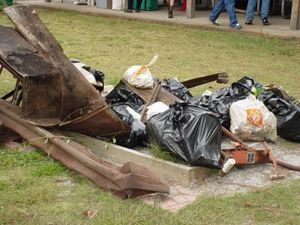Lost and found
“I once... was lost... but now... am found...”
– Amazing Grace on Lost & Found
The Lost and found is a place to put all of your unwanted crap when a garbage can or fire isn't closer. There is also the option of conveniently "losing" said crap item, at which time the Lost and found Fairies will take it to the Lost & Found box when you're not looking. Dank, smelly, and unfriendly, Lost and founds are only slightly better cherished than, say, the least livable parts of Pluto.
Etymology[edit | edit source]
It is assumed Lost and found comes from the Greek words, "Λοστ ανδ Φαυνδ", the ancient German word, laustenfünd, the ancient Chinese characters "會意字会意字" (roughly, "Ling Ang Fung"), and the Newspeak word "lostfound". Some of the more "radical linguists" believe that Lost and found came from the Old English term "losian ond findan", although they simply forgot that this is absolutely unfeasible, at best.
Benefits[edit | edit source]
Amazingly, there are actually conceivable benefits of Lost and founds.
Lost and founds typically have very flexible refund policies. Unless your item has already been taken, you may take it back at any time. Of course, this means you have to sift through the rest of the sweaty trash in the box in a vain and probably futile search for your own sweaty trash.
Poor people are able to take things from the Lost and found that they want, which is loosely considered giving back to the community. While this is not necessarily illegal for them to take these things, it is generally frowned upon if they are caught in the act and they don't think of a good lie quick enough. They can then use your old unwashed to clothes to cover themselves and the rest of your old stuff to feed their lice-ridden children.
Criticisms[edit | edit source]
There are many more criticisms of Lost and founds than there are benefits. Several of the most common are:
- You don't like that mean old lady who tends to it.
- Most of them are either at schools, libraries, and churches.
- The smell! Oh, that infernal smell of it all!
- The lost stuff that you're looking for has long been removed and/or disintegrated.
- Whenever there is cool stuff in there, your asshole "friend" takes it?
- There's a sickly kitten in there that bites people, then makes them foam at the mouth and bleat like a mildly retarded goat. And then the mean old lady tells you to hush up and take it like a man, regardless of gender. How you hate her.
Seven Days Later[edit | edit source]
When it is clear that nobody wants what's in the Lost and found (which is all of the time), they give it an extra seven days to let the items live out their tragic lives. Compare to Uncyclopedia's NRV policy. At that time they are tossed ruthlessly and without emotion into the gaping, dark, friendless oblivion that is the trash can. The experience is marginally less painful than it sounds, but what comes after isn't.

